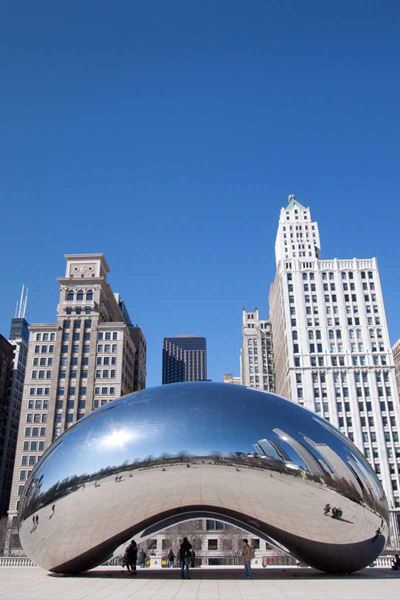When is the best time to visit Chicago?
- The best time for a sun tanning holiday is June, July, August. Average maximum temperatures are up to +82°F in July and it has 4 sunny days on average.
- In general, it’s pleasant to walk and do outdoor activities during May - September.
- If you want to avoid wet weather, then your choice is January, February, December with the lowest chance of rain.
Average weather in Chicago in different months
May, June, July, August, September, October usually has good weather. Average maximum temperature reaches +82°F during July.
In January, February, March, April, November, December the weather is average. Expect around 40 rainy days, and the precipitation amounts to approximately 94 mm in April.
Climate in Chicago
| Jan | Feb | Mar | Apr | May | Jun | Jul | Aug | Sep | Oct | Nov | Dec |
|---|---|---|---|---|---|---|---|---|---|---|---|
| Maximum Temperature | |||||||||||
| +64°F | +72°F | +77°F | +86°F | +97°F | +100°F | +104°F | +100°F | +97°F | +88°F | +75°F | +72°F |
| Average Maximum Temperature | |||||||||||
| +32°F | +34°F | +43°F | +54°F | +66°F | +77°F | +82°F | +81°F | +73°F | +61°F | +48°F | +37°F |
| Minimum Temperature | |||||||||||
| -22°F | -15°F | -4°F | +18°F | +32°F | +43°F | +55°F | +52°F | +41°F | +28°F | +9°F | -17°F |
| Avg. water temperature | |||||||||||
| +41°F | +39°F | +40°F | +45°F | +50°F | +69°F | +77°F | +77°F | +74°F | +65°F | +54°F | +47°F |
| Humidity, % | |||||||||||
| 73 | 71 | 68 | 65 | 65 | 65 | 66 | 69 | 67 | 67 | 69 | 73 |
| Rain, mm | |||||||||||
| 24 | 21 | 52 | 94 | 102 | 92 | 96 | 91 | 76 | 81 | 71 | 43 |
| Snow, mm | |||||||||||
| 31 | 29 | 19 | 5 | 0 | 0 | 0 | 0 | 0 | 0 | 4 | 20 |
| Average wind speed, m/s | |||||||||||
| 4 | 4 | 4 | 4 | 4 | 3 | 3 | 3 | 3 | 4 | 4 | 4 |
| Sunny Days | |||||||||||
| 3 | 3 | 3 | 4 | 4 | 4 | 4 | 5 | 7 | 6 | 3 | 3 |
| Cloud Days | |||||||||||
| 15 | 13 | 13 | 10 | 10 | 10 | 10 | 10 | 10 | 11 | 14 | 14 |
| Rainy Days | |||||||||||
| 3 | 2 | 7 | 12 | 13 | 11 | 11 | 12 | 11 | 12 | 10 | 6 |
| Snowy Days | |||||||||||
| 11 | 9 | 6 | 2 | 0 | 0 | 0 | 0 | 0 | 0 | 2 | 8 |
Average Temperature
Water temperature
When can you swim in Chicago?
- In July - August the water is comfortable (70°F - 77°F);
Humidity
Rain
Snow
FAQ
What is the hottest month in Chicago?
What is the coldest month in Chicago?
Is Chicago worth visiting in winter?
When does it rain the least in Chicago?
Other cities in USA
Monthly weather in Chicago
Source of the data
For this page, we’ve looked at the typical weather in Chicago, based on historical hourly weather data from January 1, 1979, to December 31, 2023.
For past dates, we show actual recorded data at the location at that time. Forecasts are based on recorded weather during that day of the year, averaged over the total years for which we have records (unless stated otherwise). The daily temperature is the highest recorded temperature in the shadow during that day.

